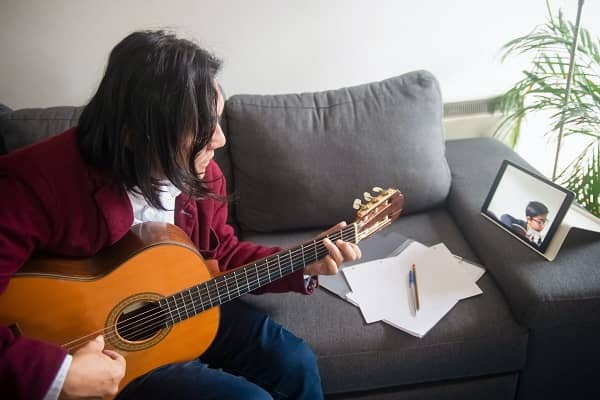Have you always dreamed of learning an instrument or becoming a seasoned vocalist? As an adult, you finally have the freedom to pursue those long-held musical passions.
Yet, with so many options for lessons and classes now available, deciding where to begin can itself feel daunting. By evaluating your goals, interests, schedule, and budget, however, you can discover the ideal instructional format tailored just for you.
Read further to compare private sessions, group classes, online platforms, and more because understanding the range of high-quality music lessons for adults out there will help you make an informed choice to start making music on your own terms.
Types of Music Lessons
The first step is deciding what type of music lessons work best for your goals and lifestyle. From vocal coaching to piano tutoring to guitar jams, there are tons of options out there!
Let’s compare the pros and cons of private lessons versus group classes.
Private Lessons
If you really want to customize your musical experience, then private music lessons may be the way to go. Sitting down one-on-one with an instructor allows you to guide the pace and direction of each lesson to match your personal progress and problem areas.
Teachers can assign you a music repertoire that fits your taste and skill level. Whether you’re an absolute beginner or a more advanced player, private lessons enable tailored feedback and training.
The flexibility of private instruction also makes it easier to schedule around an already busy routine. Many teachers offer evening or weekend lesson slots to accommodate working professionals.
The rate per hour is typically more expensive than group classes, but the trade-off is personalized attention and faster improvement in technique.
If you struggle with motivation or confidence, private music lessons can provide needed accountability and encouragement. Teachers will push you beyond your comfort zone while still being sensitive to potential sore spots.
Don’t be surprised if they assign “homework” pieces to practice during the week! This sets up a constructive cycle of regular effort and incremental mastery.
Group Lessons

For those looking for a more social music experience, group classes offer opportunities to connect with fellow adult students. Learning alongside peers provides built-in motivation and camaraderie.
You can swap practice tips or form friendships over shared musical interests. The teamwork aspect also creates accountability to show up prepared for each lesson.
Group learning is often centered around certain instruments like guitars or drums. Or it may focus on particular musical styles such as rock, classical, folk or jazz. This enhances the sense of bonding over specific skills and repertoire.
Plus group lessons tend to cost less per session than private instruction. The trade-off is that you sacrifice some personalization to the whole class’s common ability level. But for many adults, the community feeling is an integral part of the reward.
Methods and Curriculums
Music lessons for adults utilize a variety of teaching methods and formats. Let’s examine some of the instructional approaches you’re likely to encounter.
Traditional In-Person
This is the classic format where the teacher and student interact face-to-face during a set lesson time. Instruction takes place at the teacher’s home studio or a dedicated music school.
Lessons often involve assigning sheet music, working through music theory concepts, and polishing techniques. These in-person sessions may culminate in informal recitals for family or fellow students.
The routine of attending weekly lessons provides continuity and accountability. In-person instruction allows teachers to physically demonstrate proper hand positioning or posture.
They can also accompany students on a second instrument. This hand-holding approach builds confidence through measurable wins.
Online Lessons

In the digital era, remote music lessons are surging in popularity. Teachers instruct over video chat using platforms like Skype or Zoom. Some augment lessons with pre-recorded videos or interactive apps.
Remote learning allows greater flexibility if your schedule varies wildly from week to week. You also save time and money by avoiding a commute to the studio.
The main trade-off is losing in-person feedback and the motivating energy of being side-by-side. But technology assists where it can. For example, some programs enable the teacher to virtually annotate the student’s sheet music in real time.
Online students may also submit practice session recordings to get personalized feedback. And video lessons still allow teachers to demonstrate technique just like an in-studio experience.
Benefits for Adult Learners
Beyond just expanding your artistic horizons, music lessons give adult minds and lives enrichment in some profound ways. Let’s explore the array of cognitive, emotional, and social benefits you can expect.
Cognitive Benefits
Multiple research studies demonstrate that sustaining “music fitness” helps keep our brains healthy and sharp. Learning new songs engages multiple regions of the brain all at once.
You take in multi-sensory input while coordinating muscle memory. With regular practice, neural pathways specialize in processing music quicker and more adeptly.
In particular, committing melodies and lyrics to memory forms long-term neural connections. This may explain why longtime musicians often maintain cognitive vitality well into old age. Playing music fine-tunes your most vital organ!
Emotional Benefits
Playing a beautiful piece or singing a lyric that gives you goosebumps has obvious emotional rewards. Music lights up the pleasure centers of the brain.
It also provides a constructive emotional outlet when you feel stressed or blue. Sharpening your musical skills over time further boosts your confidence to continue expressing yourself.
The sense of control and release offered by music can be meditative too. Focusing on nailing a guitar solo or tricky vocal run forces you into an immersive state of flow.
For many adults, an hour spent engrossed in their instrument transports them away from nagging worries. They emerge feeling mentally refreshed and hopeful about continuing progress.
Social Benefits
As mentioned regarding group lessons, musical fellowship can lead to meaningful social bonds. Regular gatherings motivate you to put energy into improvement.
Performing for each other builds confidence through exposure therapy. You may also feel driven to help struggling bandmates if you’ve already mastered certain skills.
Music communities breed uplifting support due to shared affection for artistic pursuits. You’ll frequently encounter praise and admiration for achievements that non-music folks fail to fully appreciate!
Extending from duets to full bands, musical teamwork reflects relationship values like good communication, role flexibility, and creative problem-solving.
Choosing the Right Program
With all the available options for adult music instruction, how can you best assess what will meet your needs? It’s smart to thoroughly research potential programs, teachers, locations, formats, and pricing structures.
Let’s walk through the key criteria to consider as you shop around.
Assessing Individual Goals and Interests
Start by reflecting on your underlying motivations and desired outcomes. Are you an absolute beginner hoping to pick up musical hobbies later in life?
Maybe you played trumpet in the high school band but haven’t touched it in years. Establishing realistic objectives will help instructors develop an appropriate pace and lesson plan.
Be honest about your level of commitment too. Can you realistically practice guitar 30 minutes per day or only squeeze in sporadic sessions?
This determines whether you need a supportive cheerleader-style teacher versus a stern taskmaster. Know yourself before committing fully to any program or instructor.
You should also consider your musical preferences. Jazz piano teachers probably won’t vibe well with metalheads. Think about your favorite artists and genres as a guiding star for what style of lessons excite you.
Evaluating Quality and Reputation
While the previous section focused on self-knowledge, it’s equally important to vet instructors’ skills and track records. Pay attention to credentials like degrees, performing experience, and affiliations with music teacher organizations.
Try browsing online reviews to spot red flags from past students. Reach out for free introductory meetings too. Even a brief first impression can reveal if teaching chemistry seems likely.
A major indicator to investigate is demonstrations of student success. Ask prospective teachers if current or past students would be willing to discuss their experiences.
Maybe a teacher produces student concerts or recitals you could attend. Seeing firsthand evidence of satisfied pupils learning and advancing speaks volumes.
Considering Convenience and Accessibility
Even with the best credentials and rave reviews, an instructor is pointless if lessons don’t fit your lifestyle. Carefully analyze factors like location, scheduling, and disability accommodations.
Can you easily commute to the studio or live teaching? How do the available lesson slots fit with obligations like work, childcare, etc?
Maybe occasional video lessons could supplement in-person meetings during crammed weeks. If you have accessibility needs, inquire about adaptive instruments, classroom formats, and teaching strategies.
Maximizing convenience ensures you actually take full advantage of the lessons you’re paying for. Don’t let logistics arbitrarily derail your progress!
Comparing Affordability
Lastly but essentially, compare the overall affordability across your options. What payment plans or discounted bundles can ease budget strain? Ask if schools offer equipment loans or rentals to avoid major upfront costs.
Some music studios provide workload-related tuition discounts for teachers, healthcare workers, contractors, etc. Music teacher professional associations sometimes offer certain instruction scholarships or pro bono programs.
Explore every avenue to make lessons feasible within your financial situation!
Let the Music Play
The path awaits to make music an enriching part of your routine, whether as a social outlet, emotional release, or brain-boosting hobby. An instructor suited to your learning style and goals clears obstacles inhibiting your musical aspirations.
Schedule an intro lesson, practice patiently yet persistently, and let your newly struck chords resound! The concert of your dreams starts with a simple phone call or website click.
About the Author
Team Guitar Top Review Talk about Guitars! We are a group of friends that bonded over their shared love of playing guitar. We all have different backgrounds and experiences with music, but we share a passion for writing about the things that we love.


